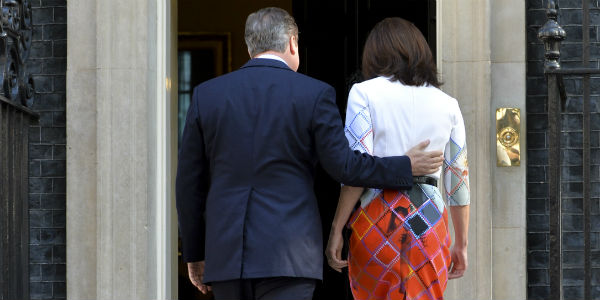Pick of 2016: the best of Democratic Audit
2016 was an extraordinary year. With Donald Trump’s presidency less than three weeks away, Article 50 due to be invoked in March, local and mayoral elections in the UK and ground-shifting votes in Europe, 2017 promises more seismic change. Here’s a selection of some of Democratic Audit’s most thought-provoking pieces from 2016.

David and Samantha Cameron go back into No 10 after his resignation speech on the day after the EU referendum. Photo: Number 10 via a CC-BY-NC-ND 2.0 licence
1. Have we reached peak democracy? Brian Klaas looks at how the West can aid rather than abet democratic societies.
2. Sebastian Jäckle and Pascal D. König mapped attacks on migrants in Germany and drew some striking conclusions about their causes.
Xenophobic violence after Brexit: how Britain could learn from Germany’s experience
3. Good government needs obedient citizens to let it function properly, right? Not according to Chris Welzel and Russell Dalton.
4. Are people truly embracing authoritarianism? Paul Schuler asks how we can find out how much democracy people are really prepared to give up to get what they want.
How can we find out whether people are really turning against democracy?
5. New PM Theresa May poured scorn on the notion that you can be a ‘citizen of the world’. Matthew Grant looks at the way notions of citizenship have changed.
‘Citizen of the world’? Think again: British citizenship after Brexit
6. Has Momentum made Labour more democratic? Fabio Wolkenstein argued we should treat the claim with scepticism.
The Labour party, Momentum and the problem with intra-party democracy
7. Some authoritarian regimes like Belarus and Zimbabwe enjoy a semblance of democracy. But as Jennifer Raymond Dresden explains, that soon comes to an end when their leaders start feeling insecure.
When authoritarian leaders start feeling insecure, nobody wins
8. Revelations about the poor performance of Concentrix, the company to which HMRC outsourced tax credit checks, amounted to a failure of administrative justice.
Justice outsourced: why Concentrix’s tax credit mistakes matter
9. Jane Mulderrig argued that the Change4Life anti-obesity campaign blamed Britons – and northerners in particular – for problems largely brought about by a failure of radical state intervention.
Fat-shaming: Change4Life’s anti-obesity ‘nudge’ campaign glosses over social inequalities
10. In July, Anne Power urged Jeremy Corbyn to stand down. He went on to win a bigger share of Labour party members’ votes. Will he survive the next round of local elections in May 2017?





 Democratic Audit's core funding is provided by the Joseph Rowntree Charitable Trust. Additional funding is provided by the London School of Economics.
Democratic Audit's core funding is provided by the Joseph Rowntree Charitable Trust. Additional funding is provided by the London School of Economics.